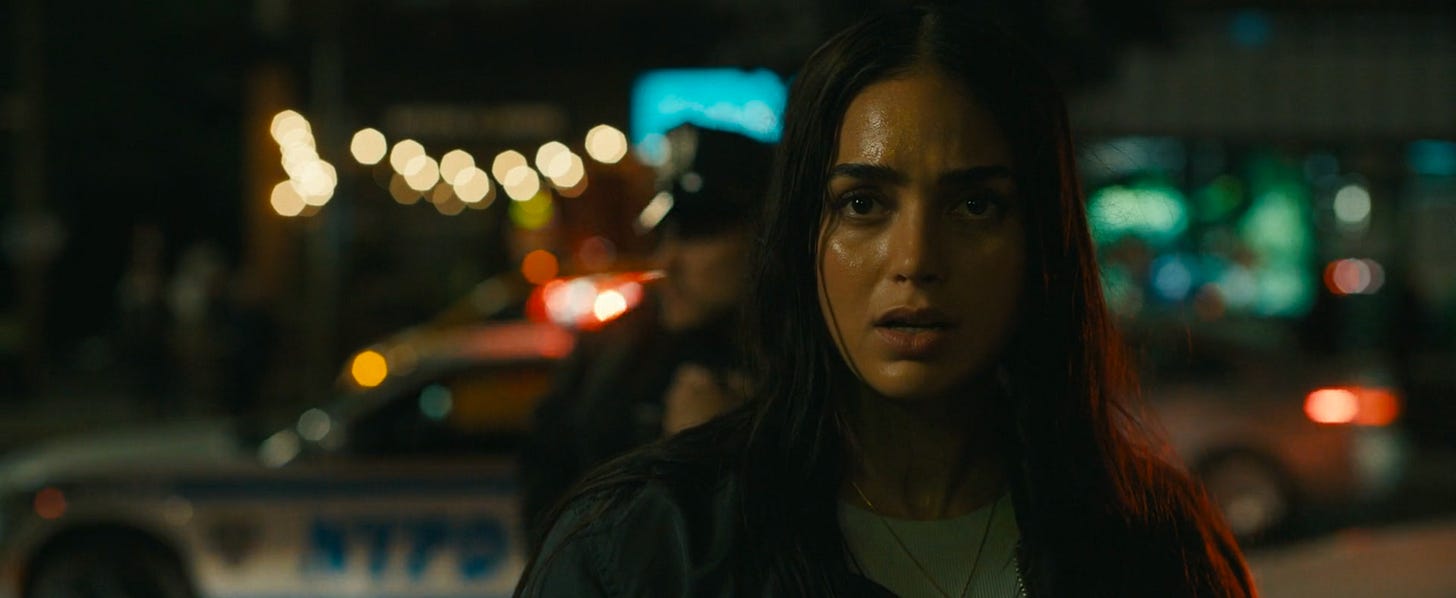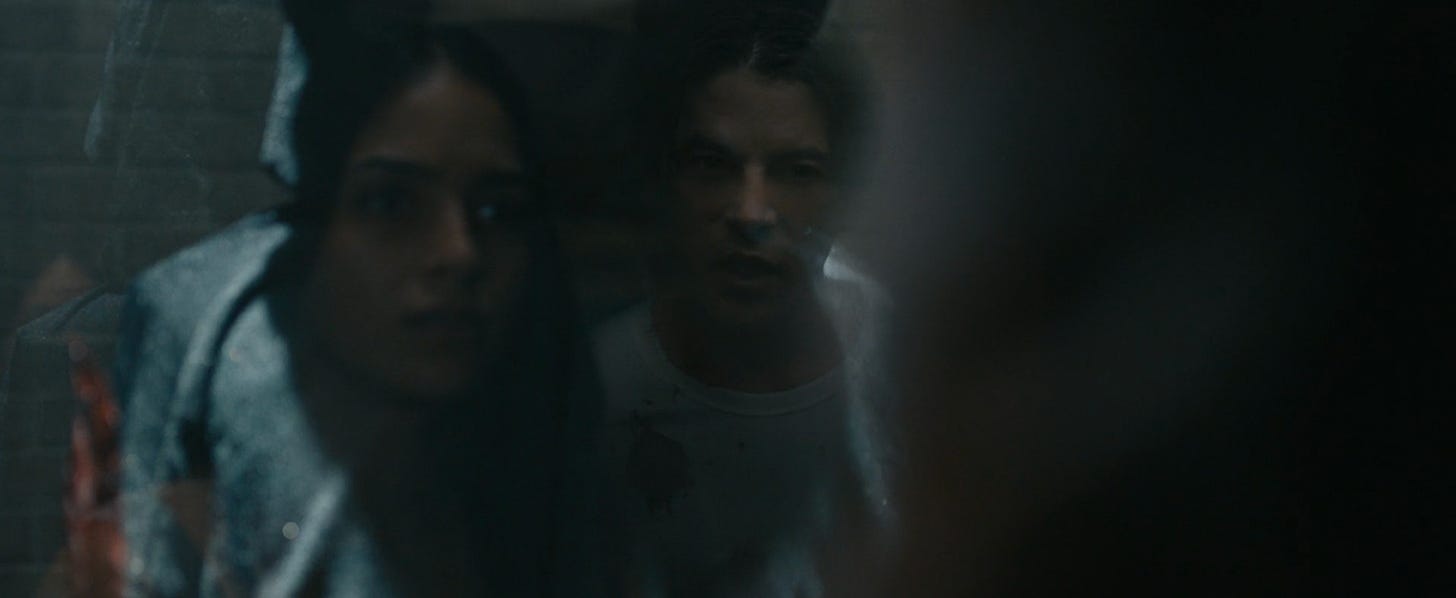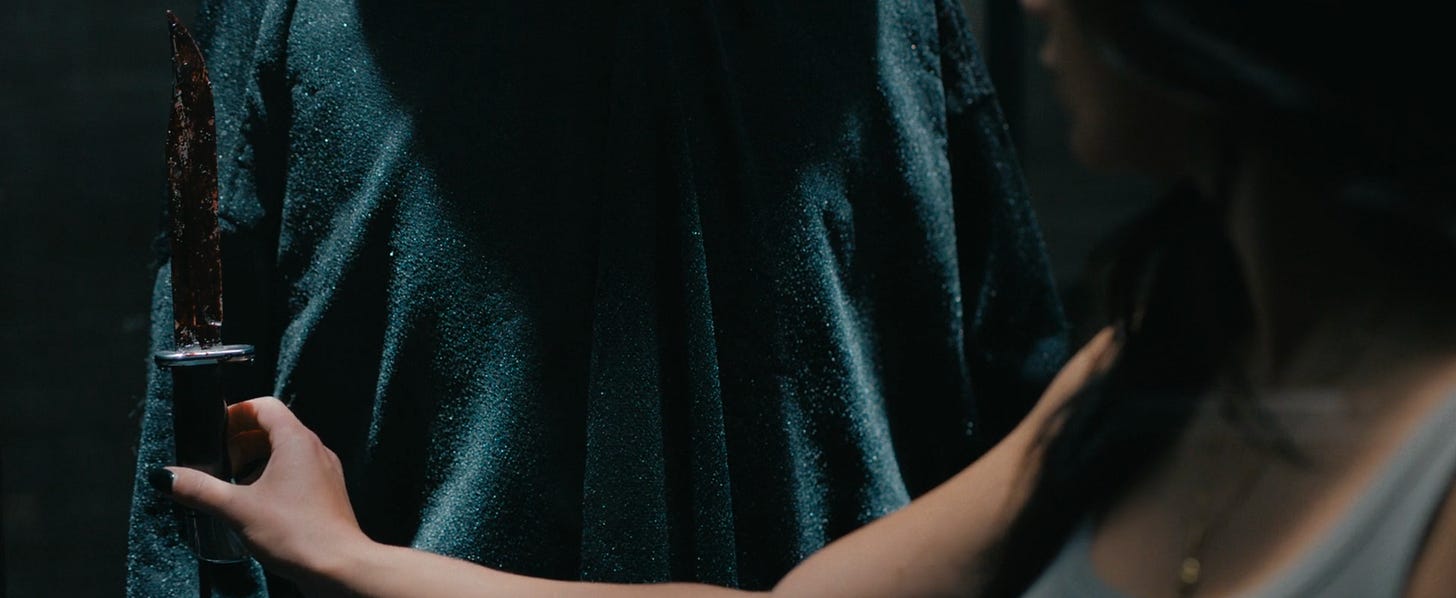SCREAM VI and the Worst Fear of All
Of all the Scream requels’s setpieces and monologues and fuck-yous and double-crosses and and defeating would-be rapists and in-jokes and wonderfully real fake stabs, Sam Carpenter's arc is the thing I vibe with most.
Thanks, I hate it.
Sure, watching Sam in a bloody tank top shoot her attempting-murder-er in the head is cathartic, hot, aspirational, etc.
But Scream VI follows up on 5cream’s fore-shadows to show exactly how this event fucks up Sam’s psyche in a far-too-relatable way.
One of the funnest things about the Scream franchise is how meta it is. This also shapes its nihilistic leanings, because despite the humour and alongside understanding, the tropes shaped by writers and audience expectations, the final message has to be driven by the subgenre’s tendencies, and the need to return and return to the same characters and story. Both these things continue to narrow the path, down and down until it reaches a fine point, which is: even when you can cheat death, you cannot escape the horrors.
In order to be properly meta and ongoing, nobody can be safe; first-scene-famous-faces and rising stars and beloved characters alike. Yes, certain characters survive, but only ‘for now’ and to the certainty of further terror, physical violence, and psychological breaks.
Mindy
Rule one: Everything is bigger than last time. Bigger budget, bigger cast, bigger body count, longer chases, shootouts, beheadings, you got to top what came before to keep people coming back.Rule two: Whatever happened last time, expect the opposite. Franchises only survive by subverting expectations. If the killers last time were whiny snowflake film nerds with Letterboxed accounts instead of personalities, you can bet the opposite will be true here.
Rule three: No one is safe. Legacy characters? Canon fodder at this point.
Once you’ve been Ghostface’s target, you can’t rest, you can’t mindlessly answer a phone, you can’t trust your loved ones. Because someone you love betrayed you, even before you became this New You, you’re forever a target.
Sam can't trust Cute Boy, so she pretends they’re not sleeping together. (Why no, I’ve never hidden a relationship with someone half because I don’t want other people to know and half because I don’t believe I can actually trust that person, why do you ask!? Anyways, this is about Sam.)
Sam, whose lack of trust runs so deep but makes so much sense that she locks Cute Boy outside a kill box. She actively cuts herself off from help because she's so damaged by the betrayals which came before, including friends, boyfriend, and a string of therapists . . . and on many levels, we the audience understand this decision even as we yell at the screen.
Yet, Sam’s deepest fear isn’t about someone turning on her, or death, or even death-and-mutilation-and-scars-that-never-fully-heal-and-the-fact-she’ll-never-be-at-peace-or-able-to-trust-or-love-again.
Mindy: Okay! So, we have our rules and we have our suspects.
Ethan: But wait, what about you guys?
Quinn: What if the trauma you all went through caused one or more of you to snap?
Ethan: Or the fame you got from the killings made you thirsty for more? I mean, let’s be honest here, some of the theories online about Sam . . .
The deepest fear which comes after profound trauma caused by people or groups you loved and trusted is about turning into the monster.
When it comes to a fear of intimacy or Ghostface, Sam can voice the one and confront and hit-with-a-brick the other.
What she can’t even reveal, let alone confront, is the terror she's becoming the thing which traumatises her, becoming the thing who hurt her sister, becoming the thing that murdered her friends.
The Scream franchise has always been interested in a cycle of creating copycats and sycophants and people who take the wrong things from art and friendship groups and community. Scream VI plays so much with cult mentality, how people so crave to be in an exclusive group — of perpetrators AND victims — they study and obsess and they create shrines to it.






The fear of turning into those sick bastards is concentrated in Sam, who’s clearly afraid she has come close or already started to complete the cycle of abuse.
Cults work hard to engender that fear in you; once you’ve started, you become afraid you can’t leave, can’t be accepted in other society, thus if you try to leave, you can’t get far before you are forced to turn back to the only ones who ‘understand’ and ‘accept’ you.
The aforementioned exposition-a-logue addresses how the Core Four can’t be exempt from suspicion: “We can't be the killers, because we've been traumatised!” is neither defense nor preventative.
The cycle of trauma creating ‘bad guys’ is borne out through the series and this movie, especially Quinn’s insights contextualised with her later reveal — all the main killers in Scream VI have (‘to what degree’ is the debatable part) been traumatised by a Ghostface legacy, the killing of their loved one, and a public airing of the details of their loss.
Of course you can you can be so traumatised by horrific events that you become the very thing that haunts you; here Sam's trauma culminates — in what now looks like it will be her final action in the franchise — with wrapping That Mask in her jacket and stealing it away.
Even if Sam never fully goes there, the deep, nauseating, tantalising fear that she will haunt her whole life.
She can't help but see it in reflections, like Billy Loomis in the glass case, hearing the voice she hates more than anything, yet doing what it says because to some extent, that's what she knows.
And to some extent, in quite super fucked up ways, Billy is right.
Lured by Ghostface’s siren song, Sam can't resist quite literally carrying a piece of her greatest, most inescapable fear with her. Whether that mask becomes a self-fulfilling prophecy or a reminder of what she must work every day to reject, is something many of us can relate to.
The question “what will Sam do to defeat herself” is one it looks as though the franchise will leave unanswered forever.
Which is, in its own way, a poetic ending.











